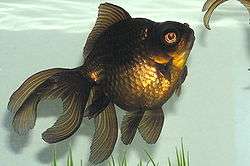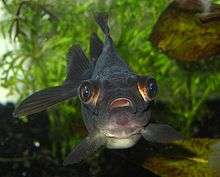Black Telescope
| Black telescope goldfish |
|---|
 |
| Country of origin |
| China[1][2] |
| Type |
| Fantailed |
| Breed standards |
| None |
The black telescope is a black variant of telescope goldfish that has a characteristic pair of protruding eyes. Black telescopes are commonly known as black moors or just moors referring to the fishes color and the term for a body of water.
History
Black telescopes are descendants of type of wild carp known as Silver Prussian Carp or Gibel Carp, this fish is believed to originate from China in 1400s. In 1500s they were traded in Japan and lastly in 1800s they made their way to USA. It is widely accepted they were a result of selective fish breeding by Chinese who first called the Dragon Fish or Dragon Eyes.
Description

Most poke telescopes have deep bodies and long, flowing finnage, with characteristic protruding eyes, but the original is fantailed and has a similar body to the fantail goldfish, from which they are derived.
Young black telescopes resemble bronze fantails. Their black coloration and eye protrusion develop with age. They can grow up to a length of 6 inches, but may lose their velvet-like appearance with increasing age (life span: 6 to 25 years). The fish can range in coloring anywhere from a lighter grey to a dark black, but most black telescope goldfish don't stay pure black forever, and many of them change from a rust-colored underbelly to orange splotches. Because their eyes are usually large, their vision is poor.
Black telescope goldfish are popular because they are hardy fish and because their black color sets them apart from the more common gold color. Goldfish are typically easy to care for. Black moors in particular are able to withstand a wide variety of temperatures. They do well with other fancy goldfish varieties.
Variants
Black telescope are telescope goldfish, and can appear in red, red-and-white, calico, black-and-white, chocolate, brown, blue, bronze, lavender and chocolate-and-blue, tricolored, and black coloration. Black-and-white moors are known as panda telescopes.
It was once theorised that blackness in goldfish is only exhibited by the telescope-eyed goldfish and that the black color is only a permanent fixture with telescope eye goldfish. However, with the recent entry of black lionheads, black orandas, black pearlscales and black hibunas, this view is no longer true.
In fact, black telescope do sometimes throw normal-eye offsprings, and they are black also. However, they are often culled as they do not conform to the telescope eye feature for the Moor variety.

In 1941, Moscow aquarist P. Andrianov, bred a kind of black telescope with a ruby-red eyes.